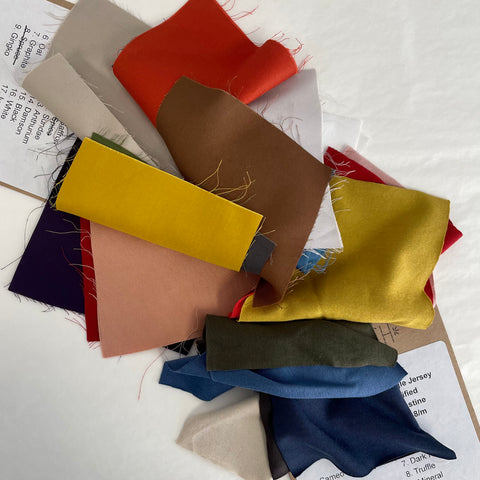At Ayten Gasson, we’re always searching for sustainable alternatives to traditional, beloved fabrics. We carry out extensive research to ensure these eco-conscious fabrics perform just as well as their conventional counterparts. Upon discovering bamboo silk and its many benefits, both in terms of comfort and environmentally, we knew it had to join our textile family. Let’s explore the origins of bamboo silk, its benefits over traditional silk and where you can find it in our online store.

Where does bamboo silk come from?
Bamboo silk, also called bamboo viscose or rayon, is a textile made from the natural cellulose fibres extracted from, you guessed it, bamboo plants. A renewable resource, bamboo can grow easily with little environmental impact and no need for harmful pesticides. After bamboo stalks have been harvested from sustainably managed forests, the plant is broken down into cellulose fibres. When this can be extracted, the fibre is then spun into thread, creating a yarn which is then made into fabric
The benefits of bamboo silk vs. traditional silk
- Sustainability - One of the biggest benefits of using bamboo silk over traditional silk is that it’s a far more sustainable fabric. Not only is bamboo renewable and extremely fast-growing but it also needs less chemical intervention to thrive. Silkworms require 187kg of mulberry leaves (a crop that calls for manure and fertiliser) to feed on to make just 1kg of silk. Bamboo silk, in turn, doesn’t have such a negative effect on greenhouse gases.
-
Luxury feel - Bamboo silk is luxe and extremely soft to the touch, rivalling even that of traditional silk. It can be used when making a range of clothing and garments, coveted for its elegant draping characteristics and kind-to-skin feel. Moisture wicking - Made from natural fibres, bamboo silk is known for its breathability and moisture-wicking abilities. Put simply, this means it will keep you cool and sweat-free on those hot summer days. In turn, although breathable, traditional silk is not thought to be quite as beneficial in warmer temperatures as its sustainable sibling fabric.
-
Hypoallergenic - Those with sensitive skin or allergies know just how irritating the wrong fabric can feel. Luckily, bamboo silk is incredibly hypoallergenic and resistant to dust mites and bacteria. While traditional silk is also considered hypoallergenic, this varies depending on the quality and production process.
-
Cost-effective - Bamboo silk is typically much more affordable than traditional silk, making it a more accessible textile for those looking to be both planet and budget-conscious. The best part? You don’t have to sacrifice quality when you save.
-
Durability - Traditional silk is infamously delicate and easy to damage. It can require more careful handling and easily snag - not ideal, especially when you’ve likely paid a hefty price tag. Bamboo silk is known for its durability and resistance to daily wear and tear. It also retains its appearance and high quality over time, meaning bamboo silk garments can be part of your lingerie drawer for a lifetime.
- Vegan - Unlike traditional silk which is made from silkworms and therefore not considered vegan, bamboo silk is inclusive for all. It’s also totally cruelty-free as the fibres come from bamboo plants.
Here are some of our favourite Bamboo Silk pieces from the collection.

Bella Yellow Bamboo Silk Camisole

Dawn Black Bamboo Silk Knicker

Bella Plum Bamboo Silk Knicker
Shop our Bamboo Silk collection here: https://www.aytengasson.com/collections/ethical-lingerie





